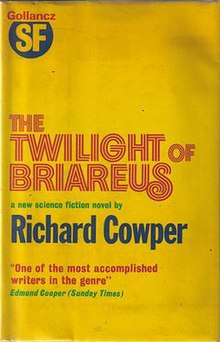The Twilight of Briareus

Original cover
|
|
| Author | "Richard Cowper" (John Middleton Murry, Jr.) |
|---|---|
| Country | United Kingdom |
| Language | English |
| Genre | Science fiction novel |
| Publisher | Gollancz |
|
Publication date
|
1974 |
| Media type | Print (hardback & paperback) |
| Pages | 255 pp |
| OCLC | 948614 |
The Twilight of Briareus is a science-fiction novel by John Middleton Murry, Jr., under his pseudonym Richard Cowper. It "combine[s] disaster and invasion themes". One critic sees it as the book that Cowper's other novels resemble at heart.
According to Cowper, he wrote the book almost immediately after his novel Kuldesak was published successfully in 1970, and Twilight was "a more substantial work in every way". His publishers rejected it, and despite his discouragement he started the novel Clone with the idea of satirising science-fiction people who didn't like Twilight. His publishers accepted it and it sold well, after which they accepted Twilight, which sold even better.
The story takes place from 1983 to 1999, mostly in England. It begins in an apparently fictitious coastal town called Hampton and goes to other places such as Oxford and Geneva, Switzerland, ending at a farm in Lincolnshire.
The star Briareus Delta that figures in the story is also fictitious; there is no constellation called Briareus (a giant in Greek mythology).
The majority of the book is a first-person account written by the protagonist, Calvin Johnson. It begins with a scene of his finding the Lincolnshire farm and continues with a long flashback told in chronological order up to that point. This narration is followed by his diary at the farm. The book ends with a "postscript" by its editor, another character.
Briareus Delta becomes a supernova only about 130 light-years from Earth. While admiring the aurora it produces, the comprehensive-school English teacher Calvin Johnson meets one of his students, Margaret Hardy. Dazed after a tornado caused by the supernova, Calvin and Margaret are mysteriously compelled into a joyless sex act. Calvin learns that Margaret and many other sixteen-year-old girls then slept around the clock and longer, with strange dreams.
A few months later, it appears that no human pregnancies have started since the supernova. Calvin and others face the possibility of the extinction of humanity. Although most scientists are baffled, the retired zoology professor Angus McHarty speculates that some powerful entities have made use of the supernova to try to "take over" humanity, and conceptions are not occurring because at a deep level people prefer extinction to losing human identity.
...
Wikipedia
